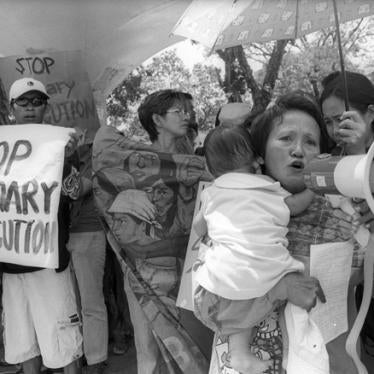When President Obama meets President Gloria Macapagal Arroyo of the Philippines today, they are likely to discuss counterterrorism cooperation. Mr. Obama should inquire if Mrs. Arroyo is still taking advice from her former consultant on security and public order, Mayor Rodrigo Duterte of Davao City.
If so, the Obama administration should be wary of associating with people who advocate murder as a means of establishing law and order.
Mr. Duterte claims to have brought peace and order to Davao City, a sprawling metropolis of 1.4 million residents in the southern Philippine island of Mindanao. Yet in Davao City, death squads kill suspected petty criminals, gang members and street children with alarming frequency.
The murders fit a pattern. Motorcycle-riding gunmen shoot or stab their victims in public places in broad daylight. The killers are so brazen that they don't even bother to mask their identities. They leave quickly, but always before the police appear, even if the police station is close by.
Family members of victims say that even when the police finally arrive at the scene, they often fail to interview witnesses or collect important evidence such as spent bullet casings. Few suspects have been apprehended, let alone convicted. The city appears to be emulating brutal populist anti-crime programs in some Latin American cities and is gaining the same notorious reputation.
Mr. Duterte, nicknamed "Dirty Harry" or "The Enforcer" by the media, has been the mayor of Davao City for most of the past two decades. He is both popular and notorious for his tough-talking stance on crime. For years, Mr. Duterte has sent chilling messages to criminals such as his repeated comment, "For as long as I am the mayor, you are a legitimate target of assassination." He denies that the death squads exist, but his words send the signal that the most powerful man in the city supports extrajudicial killings of suspected criminals.
Evidence from death-squad insiders uncovered by Human Rights Watch indicates that at least some of the killings are carried out by a group involving local officials and police. This comes as no surprise to families of death-squad victims, who have thought this for years. After all, it's the police and local officials who warn the victims that their names are on "the list" and that they should stop their criminal behavior -- or else. Those who don't heed the warning end up dead.
According to interviews with death-squad insiders, including friends and relatives of death-squad members and barangay -- or city or village district -- officials, the killers are arranged into cells, with a handler who is usually a former or current police officer. Police and barangay officials compile the lists of targets, and police are notified when and where the hit will take place.
Police have admitted their failure to arrest the killers but prefer to blame the community. "They don't help us," a police official said. "If they bring us witnesses, we will investigate." But the police lack credibility with witnesses because past investigations have not been serious. More important, because at least some elements within the police appear to be involved, witnesses have no reason to believe they will be safe if they come forward.
Sadly, the killings continue -- 69 in the first four months of 2009. In recent months, senior police officials and Mrs. Arroyo have made public statements vowing to get to the bottom of the killings. An independent national Commission on Human Rights investigation is under way. I testified at the first hearing in Davao City back in March and was impressed with the seriousness of the commission.
But the panel has few powers, and for justice to be realized, Mrs. Arroyo will have to throw her full weight behind independent investigations and witness protection. She also will have to give the green light to prosecute any senior political or security officials involved. Thus far, she and her government have shown themselves to be more interested in making statements as a public-relations exercise than in arresting the perpetrators of these vicious crimes.
In meeting Mrs. Arroyo, Mr. Obama should make it clear that the administration will be carefully scrutinizing the investigations into death-squad killings and looking for successful prosecution of the masterminds behind those killings in Davao City and other cities where the plague has spread. It's time for Mrs. Arroyo to ensure that the killers in Davao City -- and those behind them -- face justice.
Elaine Pearson is deputy director of the Asia division at Human Rights Watch.








